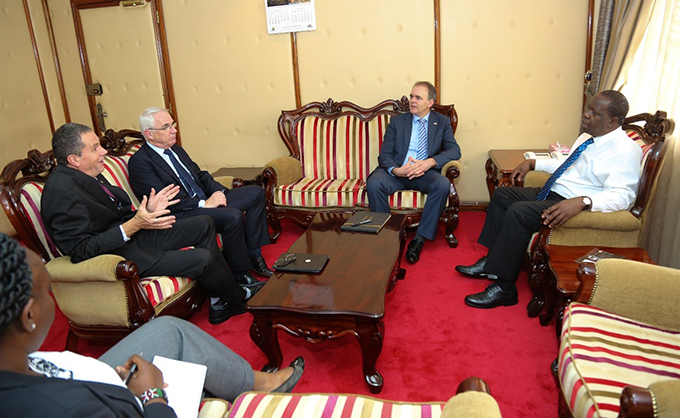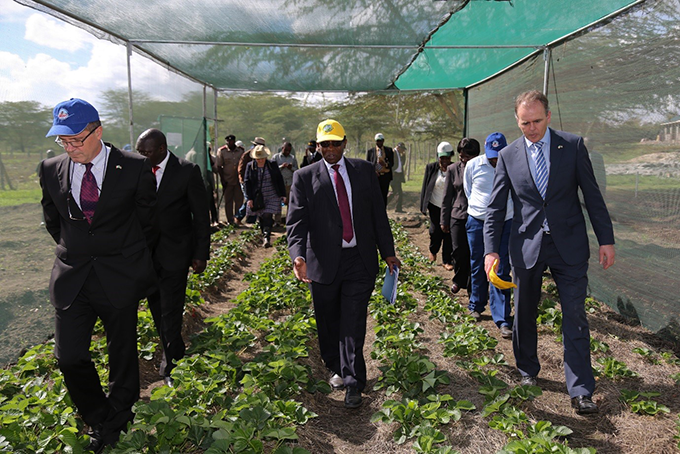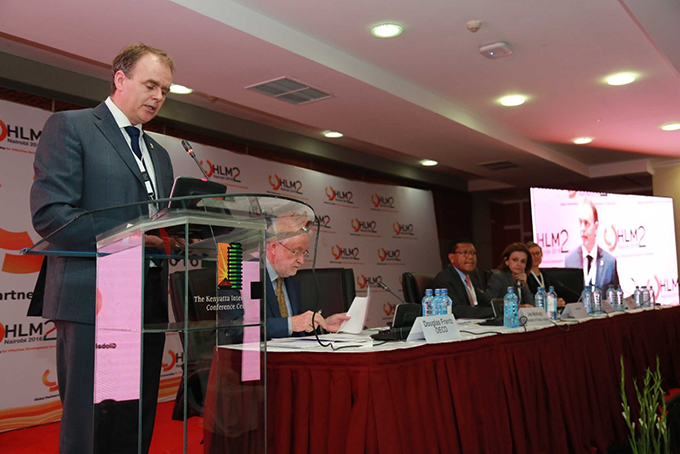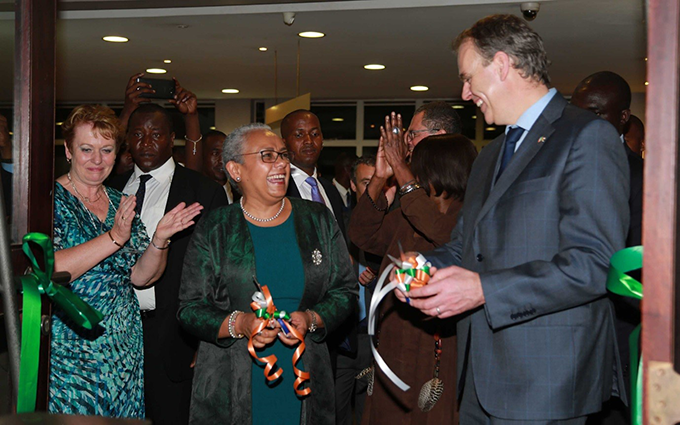Minister of State McHugh Visit to Kenya
5/12/16The Minister of State for the Diaspora and International Development, Mr Joe McHugh, T.D., visited Kenya from November 29th to December 2nd, 2016. This was the first formal visit by a Government Minister to Kenya since the re-opening of the Embassy of Ireland in Nairobi in October 2014.
During his visit to Kenya, the Minister met with business people active in the Kenya market and visited development projects managed by Irish NGOs and missionaries.
The Embassy has a budget of €450,000 in 2016 which is to be spent in a number of targeted ways. For example, the Embassy provides support to Kenyan institutions, such as the Office of the Auditor General, to help strengthen the business environment in Kenya. The Embassy also helps develop partnerships and exchange visits between Irish and Kenyan institutions in the area of agriculture and agri-food, particularly where these partnerships might benefit smallholder farmers in Africa. The Embassy is also supporting a pilot of a Young Scientist Kenya initiative, which is an exciting opportunity to learn from Ireland’s experience with the BT Young Scientist competition and to engage young Kenyans in science and how it can address development problems and obstacles preventing progress at community level and for businesses. As part of the visit, the Minister signed a joint Memorandum of Understanding with the Cabinet Secretary for Education, Science and Technology to assist Kenya in developing the Young Scientist programme.

The Embassy has worked closely with Teagasc (the organisation which provides research, advice and training to the agriculture and food industry in Ireland) and the Kenyan Agricultural and Livestock Research Organisation (KALRO) to identify how Ireland’s strengths in agriculture can inform the development of the sector. To this end, the Minister visited a farm outside Nairobi, to better understand the importance of agriculture to the Kenyan economy, and to see how the introduction of new technologies and crop varieties (some of which come from Ireland) can boost farm productivity and incomes for farmers.

While the Minister was in Kenya, he took the opportunity to deepen Ireland’s engagement and understanding of regional conflict. The Rift Valley Institute, which works on conflict prevention, brought practitioners and respected commentators and researchers together to discuss the challenges to peace building and discuss the role that Ireland might play to helping peace-building activities.
Minister McHugh also attended the Second High Level Meeting of the Global Partnership for Effective Development Cooperation (HLM2), which was hosted by the Government of Kenya. The HLM2 aimed to increase the positive impact of development co-operation over the next 15 years, and help shape how existing and new development actors can work together to implement Agenda 2030 and realise the Sustainable Development Goals.
As part of HLM2, the Minister launched the OECD States of Fragility Report, a flagship publication from the OECD, which receives funding support from Irish Aid. The Report details the level of violence in the world and proposes some recommendations to help address this issue. The report also covers research on violence and ways of monitoring fragility, and examines how global financial flows might support fragile contexts.

Minister McHugh also met with the vibrant Irish community in Kenya during his visit, including the Irish missionaries, and launched an exhibition highlighting the contribution of the Irish diaspora to Kenya and its people over the past 100 years. Over the past 100 years, Irish missionaries, non-government organizations, businesses and individuals have worked throughout Kenya and have greatly assisted in improving the livelihoods of Kenyan citizens. Their contribution, which reflects a strong history of migration and of contribution by Irish people around the world, has served to strengthen the relationship between our countries and has underpinned excellent political relationships over many years. Many Kenyans have benefitted from schools founded by Irish Missionaries, including President Uhuru Kenyatta, for example, who received his secondary education at St Mary’s College in Nairobi – a school founded and managed by the Irish Holy Ghost Fathers for many years.

The Minister travelled to Tuum in Samburu County at the invitation of the Shalom Center for Conflict Resolution and Reconciliation, an organisation founded in 2009 by an Irish missionary priest. The organisation’s mission is to help end the cycle of violence in East Africa. The Minister attended a series of meetings on conflict resolution and conflict prevention in Samburu County, in northern Kenya, and also visited Tuum Girls Secondary School, which has received funding from the Embassy for construction. The Minister also engaged with a number of Irish Non-Governmental Organisations (NGO’s) funded by Irish Aid for their development work in Kenya.
As the Embassy’s development programme also targets improving the business environment in Kenya, the Minister launched the ‘Guide to Doing Business in Kenya’, a guide collated by the Business Ireland Kenya (BIK) network detailing key information on the business environment in Kenya for interested Irish businesses.
The Minister’s final engagement was to visit two HIV and AIDS programmes, implemented by Irish Missionary Congregations who are supported by Misean Cara, which is an Irish-based charity which receives funding from Irish Aid, who then in turn provide financial support to missionary organisations and their partners in Africa, Asia and South America. Irish Aid provided Misean Cara with €9.6 million for their work in Kenya between 2012 and 2015, including to the two congregations with which the Minster met.

